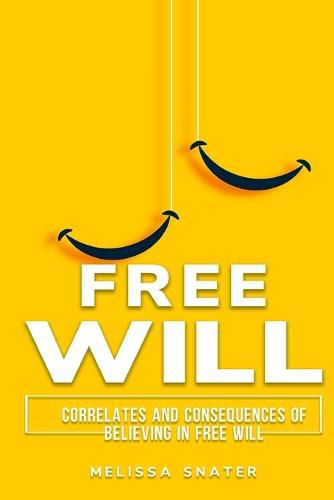Readings Newsletter
Become a Readings Member to make your shopping experience even easier.
Sign in or sign up for free!
You’re not far away from qualifying for FREE standard shipping within Australia
You’ve qualified for FREE standard shipping within Australia
The cart is loading…






This title is printed to order. This book may have been self-published. If so, we cannot guarantee the quality of the content. In the main most books will have gone through the editing process however some may not. We therefore suggest that you be aware of this before ordering this book. If in doubt check either the author or publisher’s details as we are unable to accept any returns unless they are faulty. Please contact us if you have any questions.
Few concepts are more ingrained in the collective Western psyche than free will. While there is considerable disagreement among philosophers about how the term free will should be best understood. The belief that we can (at least sometimes) make decisions and perform actions that are free from the physical constraints of our biology and environment is a pervasive Western assumption. Yet, not only is there no evidential support for such a capacity, the latest research about how the brain functions appears to point in the opposite direction. New discoveries increasingly demonstrate the many ways in which humans are subject to influences well beyond the control of the conscious self. Given that our Western sensibilities generally take free will to be the linchpin upon which all moral obligations depend (Kant, 1785), it is unsurprising that many people feel threatened by the prospect that, despite its intuitive appeal, free will may be an illusion. In the past, much of the concern surrounding free will scepticism was the more or less speculative worry that widespread acceptance of such scepticism would lead to the unravelling of our moral fabric. Recently this worry has been given empirical support. New findings from social psychology indicate that diminished belief in free will is associated with reduced prosocial tendencies and increased anti-social tendencies. In response to these findings, many academics have expressed concern that widespread doubt about the existence of free will may have a deleterious effect on individual behaviour, interpersonal relationships and the political and social institutions that rely on the assumption of it. Some have even gone so far as to recommend insulating the public from information that calls into question the existence of free will. Given how strongly this message has been resonating both within the academic community and more recently the public domain, a detailed examination of whether or not society would benefit by giving-up the belief in free will is necessary and timely
$9.00 standard shipping within Australia
FREE standard shipping within Australia for orders over $100.00
Express & International shipping calculated at checkout
This title is printed to order. This book may have been self-published. If so, we cannot guarantee the quality of the content. In the main most books will have gone through the editing process however some may not. We therefore suggest that you be aware of this before ordering this book. If in doubt check either the author or publisher’s details as we are unable to accept any returns unless they are faulty. Please contact us if you have any questions.
Few concepts are more ingrained in the collective Western psyche than free will. While there is considerable disagreement among philosophers about how the term free will should be best understood. The belief that we can (at least sometimes) make decisions and perform actions that are free from the physical constraints of our biology and environment is a pervasive Western assumption. Yet, not only is there no evidential support for such a capacity, the latest research about how the brain functions appears to point in the opposite direction. New discoveries increasingly demonstrate the many ways in which humans are subject to influences well beyond the control of the conscious self. Given that our Western sensibilities generally take free will to be the linchpin upon which all moral obligations depend (Kant, 1785), it is unsurprising that many people feel threatened by the prospect that, despite its intuitive appeal, free will may be an illusion. In the past, much of the concern surrounding free will scepticism was the more or less speculative worry that widespread acceptance of such scepticism would lead to the unravelling of our moral fabric. Recently this worry has been given empirical support. New findings from social psychology indicate that diminished belief in free will is associated with reduced prosocial tendencies and increased anti-social tendencies. In response to these findings, many academics have expressed concern that widespread doubt about the existence of free will may have a deleterious effect on individual behaviour, interpersonal relationships and the political and social institutions that rely on the assumption of it. Some have even gone so far as to recommend insulating the public from information that calls into question the existence of free will. Given how strongly this message has been resonating both within the academic community and more recently the public domain, a detailed examination of whether or not society would benefit by giving-up the belief in free will is necessary and timely